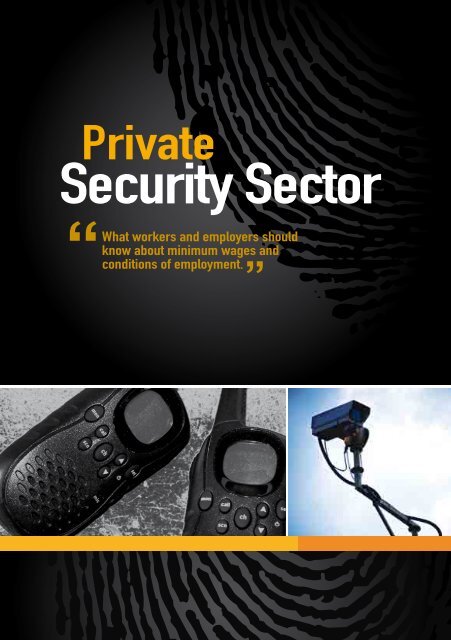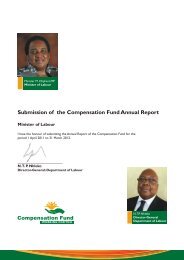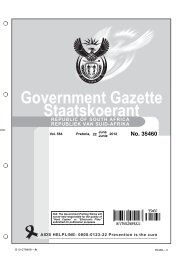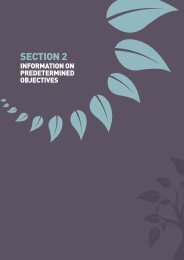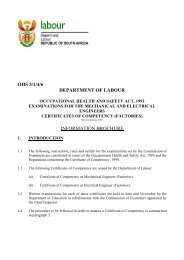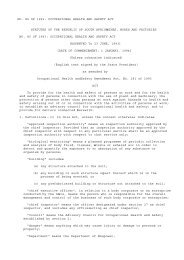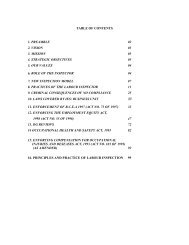ES- Private Security Sector - Department of Labour
ES- Private Security Sector - Department of Labour
ES- Private Security Sector - Department of Labour
You also want an ePaper? Increase the reach of your titles
YUMPU automatically turns print PDFs into web optimized ePapers that Google loves.
<strong>Private</strong><br />
<strong>Security</strong> <strong>Sector</strong><br />
What workers and employers should<br />
know about minimum wages and<br />
conditions <strong>of</strong> employment.
The <strong>Department</strong> <strong>of</strong> <strong>Labour</strong> has made a law which regulates the conditions<br />
<strong>of</strong> employment and minimum wages in the <strong>Private</strong> <strong>Security</strong> <strong>Sector</strong>.<br />
• This law is called the <strong>Sector</strong>al Determination for the <strong>Private</strong> <strong>Security</strong> <strong>Sector</strong><br />
that came into effect on 10 December 2001<br />
• Employers are required to pay the minimum wage as prescribed in the<br />
<strong>Sector</strong>al Determination as from the 1 September 2009<br />
• This document briefly covers some <strong>of</strong> the most important provisions in the<br />
<strong>Sector</strong>al Determination<br />
• A copy <strong>of</strong> the <strong>Sector</strong>al Determination is available from the Government Printers<br />
or the <strong>Department</strong> <strong>of</strong> <strong>Labour</strong> and also on the <strong>Department</strong>’s website:<br />
www.labour.gov.za<br />
What is the purpose <strong>of</strong> the <strong>Sector</strong>al Determination<br />
The <strong>Sector</strong>al Determination lays down conditions <strong>of</strong> employment for the <strong>Private</strong><br />
<strong>Security</strong> <strong>Sector</strong> such as hours <strong>of</strong> work, leave, particulars <strong>of</strong> employment and<br />
termination <strong>of</strong> employment. It also prescribes the minimum wage employers are<br />
required to pay.<br />
Application<br />
Who is covered<br />
Every worker in the <strong>Private</strong> <strong>Security</strong> <strong>Sector</strong>:<br />
• Who guards or protects fixed property, premises, goods, people or workers,<br />
including monitoring and responding to alarms at premises which are guarded<br />
by people or by electronic means and car guards<br />
• Administrative staff are also covered by this sectoral determination; and<br />
• Independent contractors who are doing private security work.<br />
Who is not covered by the <strong>Sector</strong>al Determination<br />
• A manager who is in charge <strong>of</strong> supervising workers; and<br />
• Any employer who is covered by a bargaining council.<br />
Minimum Wages<br />
What does the law say about wages<br />
The law says that all workers in the <strong>Private</strong> <strong>Security</strong> <strong>Sector</strong> should be paid the<br />
minimum wage as per Table 1.<br />
2 <strong>Private</strong> <strong>Security</strong>
Table1: Minimum wages for the <strong>Private</strong> <strong>Security</strong> <strong>Sector</strong><br />
Monthly Salary Rates for Year 1 (with effect from 1 September 2009)<br />
In the Magisterial Districts <strong>of</strong> Alberton, Bellville, Benoni,<br />
Boksburg, Brakpan,<br />
Camperdown, Chatsworth,<br />
Durban, Germiston, Goodwood,<br />
Inanda, Johannesburg, Kempton<br />
Park, Krugersdorp, Kuils<br />
River, Mitchell’s Plain, Nigel,<br />
Oberholzer, Paarl, Pinetown,<br />
Port Elizabeth, Pretoria,<br />
Randburg, Randfontein,<br />
Roodepoort, Sasolburg, Simon’s<br />
Town, Springs, The Cape,<br />
Uitenhage, Vanderbijlpark,<br />
Vereeniging, Westonaria,<br />
Wonderboom and Wynberg.<br />
AREA 1 AREA 2 AREA 3 AREA 4 Maximum<br />
permissible<br />
Bloemfontein, East London,<br />
Kimberley, Klerksdorp,<br />
Pietermaritzburg, Somerset<br />
West, Stellenbosch and Strand.<br />
Odendaalsrus, Potchefstroom,<br />
Virginia, Welkom and Witbank.<br />
All other areas.<br />
working hours<br />
per week for<br />
each respective<br />
category <strong>of</strong><br />
workers, subject<br />
to clause 5(2),<br />
with regard to<br />
averaging <strong>of</strong><br />
working hours.<br />
Monthly salary Hourly<br />
equivalent<br />
Monthly salary Hourly<br />
equivalent<br />
Monthly salary Hourly<br />
equivalent<br />
Monthly salary Hourly equivalent<br />
Artisan R 4,017 R 20.60 R 3,656 R 18.75 R 3,508 R 17.99 R 3,089 R 15.85 45<br />
Clerical Assistant<br />
During the first year <strong>of</strong> experience R 2,001 R 10.26 R 1,835 R 9.41 R 1,660 R 8.51 R 1,562 R 8.01<br />
During the second year <strong>of</strong> experience R 2,050 R 10.51 R 1,872 R 9.60 R 1,697 R 8.70 R 1,594 R 8.17<br />
45<br />
Thereafter R 2,095 R 10.74 R 1,925 R 9.87 R 1,749 R 8.97 R 1,631 R 8.36<br />
Clerk<br />
During the first year <strong>of</strong> experience R 2,186 R 11.21 R 1,743 R 8.94 R 1,841 R 9.44 R 1,701 R 8.72<br />
During the second year <strong>of</strong> experience R 2,381 R 12.21 R 1,962 R 10.06 R 2,005 R 10.28 R 1,843 R 9.45<br />
45<br />
During the third year <strong>of</strong> experience R 2,557 R 13.11 R 2,075 R 10.64 R 2,183 R 11.19 R 1,980 R 10.15<br />
Thereafter R 2,748 R 14.09 R 2,248 R 11.53 R 2,342 R 12.01 R 2,116 R 10.85<br />
Control or Communication Centre Operator As for relevant security <strong>of</strong>ficer grading 48<br />
Controller As for a clerical assistant 45<br />
Driver <strong>of</strong> a -<br />
Light motor vehicle R 2,106 R 10.80 R 1,952 R 10.01 R 1,770 R 9.08 R 1,636 R 8.39<br />
Medium motor vehicle R 2,325 R 11.92 R 2,147 R 11.01 R 1,967 R 10.09 R 1,804 R 9.25<br />
45<br />
Heavy motor vehicle R 2,469 R 12.61 R 2,274 R 11.66 R 2,093 R 10.73 R 1,899 R 9.74<br />
General Worker<br />
During the first six months service with the same employer R 1,639 R 8.41 R 1,504 R 7.71 R 1,349 R 6.92 R 1,283 R 6.58<br />
45<br />
Thereafter R 1,717 R 8.81 R 1,586 R 8.13 R 1,425 R 7.31 R 1,355 R 6.95<br />
Handyman R 2,332 R 11.96 R 2,160 R 11.08 R 1,989 R 10.20 R 1,817 R 9.32 45<br />
<strong>Security</strong> Officer<br />
Grade A R 3,334 R 16.03 R 3,047 R 14.65 R 2,766 R 13.30 R 2,577 R 12.39<br />
Grade B R 2,887 R 13.88 R 2,633 R 12.66 R 2,577 R 11.43 R 2,213 R 10.64<br />
Grade C R 2,367 R 11.38 R 2,180 R 10.48 R 1,968 R 9.46 R 1,849 R 8.89<br />
48<br />
Grade D R 2,195 R 10.55 R 2,007 R 9.65 R 1,824 R 8.77 R 1,704 R 8.19<br />
Grade E R 2,101 R 10.10 R 1,928 R 9.27 R 1,743 R 8.38 R 1,641 R 7.89<br />
Workers not elsewhere specified R 2,024 R 10.38 R 1,860 R 9.54 R 1,680 R 8.62 R 1,596 R 8.18 45<br />
<strong>Private</strong> <strong>Security</strong> 3
Other important provisions affecting wages<br />
Monthly salary rates for 1 September 2010<br />
[1]<br />
Grade E <strong>Security</strong> Officers will be incorporated into Grade D.<br />
[2]<br />
The increase for <strong>Security</strong> Officers Grade D in all areas will<br />
be calculated by adding the annualised Consumer Price<br />
Index plus 2% (two per cent) to the Grade D salary rates<br />
as from 1 September 2010, with a minimum increase <strong>of</strong><br />
7.25% (seven and a quarter percent) for such entry levels.<br />
[3]<br />
[4]<br />
The increase for the entry level for all other categories<br />
<strong>of</strong> workers will be calculated by adding the annualised<br />
Consumer Price Index plus 2% (two per cent) to the<br />
salary rates as from 1 September 2010, with a minimum<br />
increase <strong>of</strong> 7.25% (seven and a quarter percent) for such<br />
entry levels.<br />
The increase for all higher grades or levels for all<br />
categories will be calculated by adding the Rand value <strong>of</strong><br />
the entry levels applicable to each category to the Year 1<br />
salary levels for all such higher grades or levels.<br />
4 <strong>Private</strong> <strong>Security</strong>
Monthly salary rates for 1 September 2011<br />
[1]<br />
Area 4 will be abolished and incorporated into Area 3.<br />
[2]<br />
The increase for <strong>Security</strong> Officers Grade D in all areas<br />
will be calculated by adding the annualised Consumer<br />
Price Index plus 2% (two per cent) to the Grade D salary<br />
rates as from 1 September 2011, with a minimum<br />
increase <strong>of</strong> 7% (seven percent) for such entry levels.<br />
[3]<br />
The increase for the entry level for all other categories<br />
<strong>of</strong> employees will be calculated by adding the annualised<br />
Consumer Price Index plus 2% (two per cent) to the<br />
salary rates as from 1 September 2011.<br />
[4]<br />
The increase for all higher grades or levels for all<br />
categories will be calculated by adding the Rand value <strong>of</strong><br />
the entry levels applicable to each category to the Year 2<br />
salary levels for all such higher grades or levels.<br />
Note to Year 2 and Year 3 tables, above:<br />
The term “entry level” refers to the lowest remuneration level in each<br />
specified category <strong>of</strong> workers referred to in the salary tables, as for Year 1.<br />
NB!! It is an unfair labour practice to reduce the wages <strong>of</strong> a worker in<br />
the <strong>Private</strong> <strong>Security</strong> <strong>Sector</strong> who earns more than the prescribed wage.<br />
<strong>Private</strong> <strong>Security</strong> 5
Calculation <strong>of</strong> wages<br />
Wages are calculated using ordinary hours <strong>of</strong> work<br />
• Daily wage divided by ordinary hours worked in a day = hourly wage<br />
• Weekly wage divided by ordinary weekly hours = hourly wage<br />
• Monthly wage divided by 4.333 = weekly wage.<br />
Payment <strong>of</strong> wages<br />
Must be paid:<br />
• In South African currency<br />
• In cash or cheque or direct payment in the bank account<br />
• Daily, weekly, fortnightly or monthly<br />
• At the workplace during working hours<br />
• On a normal pay day agreed to by the worker; and<br />
• Within 48 hours <strong>of</strong> termination <strong>of</strong> employment.<br />
Information concerning wages<br />
Every worker must receive, on payday, a payslip showing:<br />
• Employer’s name and address<br />
• Worker’s name and occupation<br />
• Period <strong>of</strong> payment<br />
• Worker’s wage and overtime<br />
• Hours worked<br />
• Overtime worked<br />
• Hours worked and pay for Sunday and Public Holidays<br />
• Wage<br />
• Any other pay<br />
• Deductions<br />
• Net payment.<br />
The payslip is the property <strong>of</strong> the worker.<br />
Spares or Relievers<br />
Should be employed on a full time basis and they should be paid the amount that<br />
they would have ordinarily earned even if they have not been placed in a post.<br />
6 <strong>Private</strong> <strong>Security</strong>
Prohibited acts concerning pay<br />
Permissible deductions<br />
• Medical insurance<br />
• Savings<br />
• Pension or provident fund<br />
• Trade union subscription<br />
• Order <strong>of</strong> account payment to a registered financial institution<br />
• Loan which will not exceed one third <strong>of</strong> the total remuneration.<br />
What the law says about deductions<br />
Deductions not allowed<br />
• Amount greater than the actual remuneration received<br />
• Uniform<br />
• Protective clothing and weapons<br />
• Training provided.<br />
Allowances<br />
Night shift allowance<br />
If the night shift falls between 18:00 and 06:00 the next day, the worker shall receive<br />
an allowance as follows:<br />
• R4.00 per shift as from 1 September 2009<br />
• R5.00 per shift as from 1 September 2010.<br />
Special allowance<br />
A worker who works as a mobile supervisor, armed security <strong>of</strong>ficer, armed response<br />
<strong>of</strong>ficer, national key point <strong>of</strong>ficer and control centre operator are entitled to the<br />
special allowance or R5.50 per shift.<br />
Transfer allowance<br />
An employer shall pay a security <strong>of</strong>ficer a transfer allowance <strong>of</strong> not less than R100<br />
provided that:<br />
a) The transfer is permanent and the worker is entitled to a transfer allowance<br />
for a period <strong>of</strong> not less than 12 months.<br />
b) The transfer is for a period exceeding six months but not exceeding 12 months.<br />
c) The site is more than 250 kilometers away.<br />
d) Except transfer arising from alternative employment by the employer or as<br />
a result <strong>of</strong> a worker’s request.<br />
<strong>Private</strong> <strong>Security</strong> 7
Conditions <strong>of</strong> employment [Written Particulars <strong>of</strong> Employment]<br />
An employer must supply a worker with the following:<br />
• Full name and address <strong>of</strong> the employer<br />
• Name and occupation <strong>of</strong> the worker or brief description <strong>of</strong> work<br />
• Various places <strong>of</strong> work<br />
• Date <strong>of</strong> employment<br />
• Ordinary hours <strong>of</strong> work and days <strong>of</strong> work<br />
• Wage or the rate and method <strong>of</strong> payment<br />
• The rate <strong>of</strong> pay for overtime work<br />
• Any other cash payments<br />
• Any payment in kind and the value there<strong>of</strong><br />
• How frequently wages will be paid<br />
• Any deductions<br />
• Leave entitlement<br />
• The period <strong>of</strong> notice to terminate employment.<br />
Hours <strong>of</strong> work<br />
How many ordinary hours <strong>of</strong> work in the <strong>Security</strong> Industry<br />
• A security <strong>of</strong>ficer should not work more than 48 hours per week<br />
• Other workers should not work more than 45 hours per week.<br />
Overtime<br />
• Can only be worked by agreement concluded by the employer and<br />
the worker<br />
• Not more than three hours per day<br />
• Not more than 10 hours per week.<br />
Payment <strong>of</strong> overtime<br />
• Overtime should be paid at one-and-a-half times the worker’s wage for<br />
overtime worked<br />
• An agreement may provide for an employer to pay a worker not less than the<br />
ordinary wage for overtime worked and give the worker at least 30 minutes<br />
time <strong>of</strong>f on full pay for each hour worked; or<br />
• Give a worker at least 90 minutes paid time <strong>of</strong>f for each hour worked<br />
• Paid time <strong>of</strong>f should be given within one month <strong>of</strong> a worker becoming entitled<br />
to it, however an agreement in writing may increase this period to 12 months.<br />
8 <strong>Private</strong> <strong>Security</strong>
Rest period<br />
An employer must give a worker:<br />
• A daily rest period <strong>of</strong> at least 12 consecutive hours between ending work and starting<br />
work the next day<br />
• A written agreement could lessen it to 10 hours if the worker lives on the<br />
premises at which the workplace is situated and whose meal interval lasts<br />
for at least three hours<br />
• A weekly rest period <strong>of</strong> at least 36 consecutive hours which, unless otherwise<br />
agreed, must include a Sunday<br />
• A written agreement may also provide for a rest period <strong>of</strong> at least 60 consecutive<br />
hours every second week.<br />
Meal intervals<br />
• A worker must have a meal interval <strong>of</strong> one hour after five hours <strong>of</strong> continuous work<br />
• A worker can only perform duties that cannot be left unattended and cannot be<br />
performed by another worker and must be paid for such work<br />
• No deduction shall be made in respect <strong>of</strong> a meal interval to reduce the monthly<br />
salary.<br />
Annual bonus<br />
• Every security <strong>of</strong>ficer shall be paid an annual bonus as provided for in the <strong>Sector</strong>al<br />
Determination.<br />
Public holiday<br />
• Can only be worked per agreement<br />
• If the public holiday falls on the day on which a worker would ordinarily work, an<br />
employer must pay the worker who does not work at least the normal wage for<br />
that day<br />
• If a worker works on the public holiday, the worker must be paid at least double<br />
the rate for that day worked.<br />
Leave<br />
What type <strong>of</strong> leave is a worker entitled to<br />
• Five types <strong>of</strong> leave: Ordinary annual leave, sick leave, family responsibility leave,<br />
maternity leave and study leave.<br />
<strong>Private</strong> <strong>Security</strong> 9
Annual leave<br />
How many days are workers entitled to<br />
• Workers are entitled to 21 consecutive days <strong>of</strong> leave per annum<br />
What happens if a public holiday falls within the annual leave cycle<br />
• An extra day’s paid leave should be granted.<br />
Sick leave<br />
What is important to note regarding sick leave<br />
• The sick leave cycle is 36 months based on the number <strong>of</strong> days worked over a<br />
six-week period.<br />
Example:<br />
An employee works 5 days per week.<br />
Sick leave days per cycle are 5 X 6<br />
(number <strong>of</strong> weeks) = 30 days per<br />
three-year cycle<br />
Note: The employer may<br />
request a medical certificate<br />
when a worker is absent for<br />
more than two consecutive<br />
days, or twice during an<br />
eight-week period.<br />
Family responsibility leave<br />
What is family responsibility leave<br />
• It is leave granted for specific family related matters.<br />
Who qualifies for this type <strong>of</strong> leave<br />
• Workers who have been employed by an employer for longer than four<br />
months; and who works on at least four days a week for that employer are<br />
entitled to three days family responsibility leave during an annual leave cycle<br />
• Family responsibility leave shall increase to four days in September 2010.<br />
When may this leave be taken<br />
• This leave may be taken for the birth <strong>of</strong> a child, when a child is sick or<br />
when a spouse, parent, adoptive parent, grandparent, adoptive child, child,<br />
grandchild, brother or sister dies.<br />
10 <strong>Private</strong> <strong>Security</strong>
Maternity leave<br />
What are the key issues relating to maternity leave<br />
• Maternity leave is a four-month period, which starts four weeks before the<br />
expected date <strong>of</strong> birth<br />
• An employer must pay a female security <strong>of</strong>ficer, who has been in the service<br />
with the same employer for a period <strong>of</strong> not less than three years, 34% <strong>of</strong> her<br />
basic salary during maternity leave as a supplement to her Unemployment<br />
Insurance Fund (UIF) payment<br />
• A worker may only resume work six weeks after the birth <strong>of</strong> a child; unless a<br />
medical practitioner certifies that the worker may begin work.<br />
Note:<br />
• Where possible, notice <strong>of</strong> leave and date <strong>of</strong> return to work<br />
must be provided before the leave begins.<br />
Study leave<br />
• Every worker with a minimum <strong>of</strong> one year uninterrupted employment with the<br />
same employer is entitled to six days paid study leave in a year, in respect <strong>of</strong> any<br />
study at a tertiary establishment.<br />
Service benefits<br />
Each security <strong>of</strong>ficer shall upon completion <strong>of</strong> the following uninterrupted service<br />
with the same employer, calculated from 19 February 2007, and is entitled to a<br />
once-<strong>of</strong>f payment as follows:<br />
a) R500 after five years.<br />
b) R1 000 after 10 years.<br />
c) R5 000 after 20 years.<br />
Weapons, uniforms, overalls and protective clothing<br />
• An employer must provide free <strong>of</strong> charge any weapon, ammunition tool, whistle<br />
or other equipment which a security <strong>of</strong>ficer requires to use for self-defence or<br />
apprehension<br />
• Provide, free <strong>of</strong> charge, two sets <strong>of</strong> daily washable uniform items, as well as<br />
any other protective clothing which a worker is required by any law to provide for<br />
a worker<br />
• An employer shall pay a worker a R15-00 cleaning allowance which is not<br />
payable during period <strong>of</strong> absence.<br />
<strong>Private</strong> <strong>Security</strong> 11
Temporary employment service, labour brokers<br />
and independent contractors<br />
Employers shall abide by the provisions <strong>of</strong> the <strong>Labour</strong> Relations Act, No. 66 <strong>of</strong> 1995,<br />
as amended.<br />
No employer may use the service <strong>of</strong> a temporary employment service, labour<br />
brokers or independent contractors unless the temporary employment service,<br />
labour broker or independent contractor provides the employer with satisfactory<br />
pro<strong>of</strong> that it is in compliance with:<br />
a) <strong>Sector</strong>al Determination 6<br />
b) Unemployment Insurance Act<br />
c) Compensation for Occupational Injuries and Diseases Act<br />
d) South African Revenue Service and in possession <strong>of</strong> an IT30 tax certificate<br />
e) The rules <strong>of</strong> the <strong>Private</strong> <strong>Security</strong> Provident Fund.<br />
Provident Fund<br />
Every worker in the <strong>Private</strong> <strong>Security</strong> <strong>Sector</strong> should be a member <strong>of</strong> the <strong>Private</strong><br />
<strong>Security</strong> Provident Fund. A worker will contribute 6.5% <strong>of</strong> the basic salary to the<br />
Fund and the employer will contribute 6.5% to the Fund. In September 2010, both<br />
parties must contribute 7% and in September 2011 both parties shall contribute<br />
7.5%.<br />
Waiting period<br />
• New workers and workers who have been out <strong>of</strong> the sector for more than six<br />
months <strong>of</strong> service are subjected to a four-month waiting period before joining<br />
the Provident Fund<br />
• Workers with at least four months uninterrupted service in the security industry<br />
not necessarily with the same employer, shall join the fund immediately after<br />
joining the new employer.<br />
Prohibition <strong>of</strong> child labour and forced labour<br />
• No person may employ a child in the <strong>Private</strong> <strong>Security</strong> <strong>Sector</strong> who is under 15<br />
years <strong>of</strong> age<br />
• Who is under the minimum school-leaving age<br />
• No person may employ a child in employment that is inappropriate for a<br />
person <strong>of</strong> that age; or that places at risk the child’s well-being, education,<br />
physical or mental health, or spiritual, moral or social development<br />
• All forced labour is prohibited.<br />
12 <strong>Private</strong> <strong>Security</strong>
Termination <strong>of</strong> employment<br />
How should termination <strong>of</strong> employment be conducted<br />
• Either party may terminate the contract <strong>of</strong> service. If a worker worked for six<br />
months or less, one weeks’ notice must be given<br />
• If the worker has been employed for more than six months but not more than a<br />
year, two weeks’ notice must be given<br />
• If the worker has been employed for one year or more, four weeks’ notice<br />
must be given.<br />
N.B. Notice must be given in writing, except when it is given by an illiterate worker.<br />
Note: The employer may not give notice during a leave period or let it run at<br />
the same time with any period <strong>of</strong> leave, except sick leave. Payment instead<br />
<strong>of</strong> notice may be paid, provided it is equal to the period <strong>of</strong> notice.<br />
Payment on termination<br />
On termination an employer should pay:<br />
• All outstanding monies due<br />
• Accrued annual leave<br />
• Any time-<strong>of</strong>f not granted<br />
• One weeks’ severance pay for every completed year <strong>of</strong> service if the employer<br />
terminates service BASED ON OPERATIONAL REQUIREMENTS.<br />
Certificate <strong>of</strong> Service<br />
The employer must give the worker a Certificate <strong>of</strong> Service on termination <strong>of</strong><br />
employment.<br />
The following should be indicated on the certificate:<br />
• The full name <strong>of</strong> the worker<br />
• The name and address <strong>of</strong> the employer<br />
• The date the worker started working<br />
• The date the work ended<br />
• A description <strong>of</strong> the work<br />
• Any training provided<br />
• The wage received<br />
• The reason for leaving (if the worker wants it included).<br />
<strong>Private</strong> <strong>Security</strong> 13
Records<br />
What records must be kept<br />
• An employer is required to give the worker a payslip and written particulars <strong>of</strong><br />
employment<br />
• Attendance registers should be kept, unless there is an agreement to the<br />
contrary.<br />
General provisions<br />
Keeping <strong>of</strong> the <strong>Sector</strong>al Determination<br />
Every employer on whom this <strong>Sector</strong>al Determination is binding must keep a copy<br />
<strong>of</strong> the <strong>Sector</strong>al Determination or an <strong>of</strong>ficial summary, available in the workplace in a<br />
place to which the workers have access.<br />
Enquiries can be directed to:<br />
<strong>Department</strong> <strong>of</strong> <strong>Labour</strong><br />
Head Office<br />
Employment Standards<br />
<strong>Private</strong> Bag X 117<br />
Pretoria 0001<br />
14 <strong>Private</strong> <strong>Security</strong>
Provincial Offices <strong>of</strong> the <strong>Department</strong> <strong>of</strong> <strong>Labour</strong><br />
Eastern Cape<br />
East London Tel: (043) 701 3000<br />
Free State<br />
Bloemfontein Tel: (051) 505 6200<br />
Gauteng North<br />
Pretoria Tel: (012) 309 5000<br />
Gauteng South<br />
Johannesburg Tel: (011) 853 0300<br />
KwaZulu-Natal<br />
Durban Tel: (031) 366 2000<br />
Limpopo<br />
Polokwane Tel: (015) 290 1744<br />
Mpumalanga<br />
Witbank Tel: (013) 655 8700<br />
North West<br />
Mmabatho Tel: (018) 387 8100<br />
Northern Cape<br />
Kimberley Tel: (053) 838 1500<br />
Western Cape<br />
Cape Town Tel: (021) 441 8000<br />
<strong>Labour</strong> Centres <strong>of</strong> the <strong>Department</strong> <strong>of</strong> <strong>Labour</strong><br />
Eastern Cape<br />
Aliwal North Tel: (051) 633 2633<br />
Butterworth Tel: (047) 491 0656<br />
Cradock Tel: (048) 881 3010<br />
East London Tel: (043) 702 7500<br />
Fort Beaufort Tel: (046) 645 4686<br />
Graaf-Reinet Tel: (049) 892 2142<br />
Grahamstown Tel: (046) 622 2104<br />
King William’s Tel: (043) 643 4756<br />
Town<br />
Lusikisiki Tel: (039) 253 1996<br />
Maclear Tel: (045) 932 1424<br />
Mdantsane Tel: (043) 761 3151<br />
Mount Ayliff Tel: (039) 254 0282<br />
Mthatha Tel: (047) 501 5600<br />
Port Elizabeth Tel: (041) 582 4472<br />
Queenstown Tel: (045) 807 5400<br />
Uitenhage Tel: (041) 992 4627<br />
Free State<br />
Bethlehem Tel: (058) 303 5293<br />
Bloemfontein Tel: (051) 505 6201<br />
Botshabelo Tel: (051) 534 3789<br />
Ficksburg Tel: (051) 933 2299<br />
Harrismith Tel: (058) 623 2977<br />
Kroonstad Tel: (056) 215 1812<br />
Petrusburg Tel: (053) 574 0932<br />
Phuthaditjhaba Tel: (058) 713 0373<br />
Sasolburg Tel: (016) 970 3200<br />
Soshanguve Tel: (012) 799 7400<br />
Temba Tel: (012) 717 9500<br />
Welkom Tel: (057) 391 0200<br />
Zastron Tel: (051) 673 1471<br />
Gauteng North<br />
Atteridgeville Tel: (012) 386 5116<br />
Bronkhorstspruit Tel: (013) 932 0197<br />
Garankuwa Tel: (012) 702 4525<br />
Krugersdorp Tel: (011) 955 4420<br />
Mamelodi Tel: (012) 805 5090<br />
Pretoria Tel: (012) 309 5050<br />
Randfontein Tel: (011) 693 3618<br />
Gauteng South<br />
Alberton Tel: (011) 861 6130<br />
Benoni Tel: (011) 747 9601<br />
Boksburg Tel: (011) 898 3340<br />
Brakpan Tel: (011) 744 9000<br />
Carletonville Tel: (018) 788 3281<br />
Germiston Tel: (011) 345 6300<br />
Johannesburg Tel: (011) 497 3000<br />
Kempton Park Tel: (011) 975 9301<br />
Nigel Tel: (011) 814 7095<br />
Randburg Tel: (011) 781 8144<br />
Roodepoort Tel: (011) 766 2000<br />
Sandton Tel: (011) 444 7631<br />
Sebokeng Tel: (016) 592 3825<br />
Soweto Tel: (011) 939 1200<br />
Springs Tel: (011) 365 3700<br />
Vanderbijlpark Tel: (016) 981 0280<br />
Vereeniging Tel: (016) 430 0000<br />
<strong>Private</strong> <strong>Security</strong> 15
KwaZulu-Natal<br />
Dundee Tel: (034) 212 3147<br />
Durban Tel: (031) 336 1500<br />
Estcourt Tel: (036) 352 2161<br />
Kokstad Tel: (039) 727 2140<br />
Ladysmitah Tel: (036) 638 1900<br />
Newcastle Tel: (034) 312 6038<br />
Pietermaritzburg Tel: (033) 341 5300<br />
Pinetown Tel: (031) 701 7740<br />
Port Shepstone Tel: (039) 682 2406<br />
Prospecton Tel: (031) 913 9700<br />
Richards Bay Tel: (035) 780 8700<br />
Richmond Tel: (033) 212 2768<br />
Stanger Tel: (032) 551 4291<br />
Ulundi Tel: (035) 879 1439<br />
Verulam Tel: (032) 541 5600<br />
Vryheid Tel: (034) 980 8992<br />
Limpopo<br />
Giyani Tel: (015) 812 9041<br />
Jane Furse Tel: (013) 265 7210<br />
Lebowakgomo Tel: (015) 633 9360<br />
Lephalale Tel: (014) 763 2162<br />
Makhado Tel: (015) 516 0207<br />
Modimolle Tel: (014) 717 1046<br />
Mokopani Tel: (015) 491 5973<br />
Phalaborwa Tel: (015) 781 5114<br />
Polokwane Tel: (015) 299 5000<br />
Seshego Tel: (015) 223 7020<br />
Thohoyandou Tel: (015) 960 1300<br />
Tzaneen Tel: (015) 306 2600<br />
Mpumalanga<br />
Baberton Tel: (013) 712 3066<br />
Bethal Tel: (017) 647 5212<br />
Carolina Tel: (017) 843 1077<br />
Eerstehoek Tel: (017) 883 2414<br />
eMalahleni<br />
/ Witbank Tel: (013) 653 3800<br />
Ermelo Tel: (017) 819 7632<br />
Groblersdal Tel: (013) 262 3150<br />
Kwamhlanga Tel: (013) 947 3173<br />
KaMhlushwa Tel: (013) 785 0010<br />
Lydenburg Tel: (013) 235 2368<br />
Middelburg Tel: (013) 283 3600<br />
Nelspruit Tel: (013) 753 2844<br />
Piet Retief Tel: (017) 826 1883<br />
Sabie Tel: (013) 764 2105<br />
Secunda Tel: (017) 631 2594<br />
Standerton Tel: (017) 712 1351<br />
Volksrust Tel: (017) 735 2994<br />
Northern Cape<br />
Calvinia Tel: (027) 341 1280<br />
De Aar Tel: (053) 631 0952<br />
Kimberley Tel: (053) 838 1500<br />
Kuruman Tel: (053) 712 3952<br />
Postmasburg Tel: (053) 313 0641<br />
Springbok Tel: (027) 718 1058<br />
Upington Tel: (054) 331 1752<br />
North West<br />
Brits Tel: (012) 252 3068<br />
Christiana Tel: (053) 441 2120<br />
Klerksdorp Tel: (018) 464 8700<br />
Lichtenburg Tel: (018) 632 4323<br />
Mafikeng Tel: (018) 381 1010<br />
Mogwase Tel: (014) 555 5693<br />
Potchefstroom Tel: (018) 297 5100<br />
Rustenburg Tel: (014) 592 8214<br />
Taung Tel: (053) 994 1710<br />
Vryburg Tel: (053) 927 5221<br />
Western Cape<br />
Beaufort West Tel: (023) 414 3427<br />
Bellville Tel: (021) 941 7000<br />
Cape Town Tel: (021) 468 5500<br />
George Tel: (044) 801 1201<br />
Knysna Tel: (044) 382 3150<br />
Mitchell’s Plain Tel: (021) 391 0591<br />
Mossel Bay Tel: (044) 691 1140<br />
Oudtshoorn Tel: (044) 272 4370<br />
Paarl Tel: (021) 872 2020<br />
Somerset West Tel: (021) 852 2535<br />
Vredenburg Tel: (022) 715 1627<br />
Worcester Tel: (023) 347 0152<br />
(English) Layout and design by the Design Studio (Nontembiso Kgatle)<br />
Directorate <strong>of</strong> Communication, <strong>Department</strong> <strong>of</strong> <strong>Labour</strong>.<br />
Website: www.labour.gov.za


